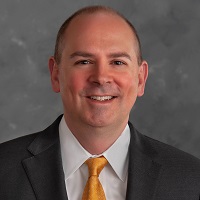Key to Financial Peace of Mind: Think 'What's Next?' Rather Than 'What If?'
Even if you've hit your magic number for retirement, it's hard to stop worrying about money. Giving it a clear purpose is one way to reduce financial anxiety.


Profit and prosper with the best of Kiplinger's advice on investing, taxes, retirement, personal finance and much more. Delivered daily. Enter your email in the box and click Sign Me Up.
You are now subscribed
Your newsletter sign-up was successful
Want to add more newsletters?

Delivered daily
Kiplinger Today
Profit and prosper with the best of Kiplinger's advice on investing, taxes, retirement, personal finance and much more delivered daily. Smart money moves start here.

Sent five days a week
Kiplinger A Step Ahead
Get practical help to make better financial decisions in your everyday life, from spending to savings on top deals.

Delivered daily
Kiplinger Closing Bell
Get today's biggest financial and investing headlines delivered to your inbox every day the U.S. stock market is open.

Sent twice a week
Kiplinger Adviser Intel
Financial pros across the country share best practices and fresh tactics to preserve and grow your wealth.

Delivered weekly
Kiplinger Tax Tips
Trim your federal and state tax bills with practical tax-planning and tax-cutting strategies.

Sent twice a week
Kiplinger Retirement Tips
Your twice-a-week guide to planning and enjoying a financially secure and richly rewarding retirement

Sent bimonthly.
Kiplinger Adviser Angle
Insights for advisers, wealth managers and other financial professionals.

Sent twice a week
Kiplinger Investing Weekly
Your twice-a-week roundup of promising stocks, funds, companies and industries you should consider, ones you should avoid, and why.

Sent weekly for six weeks
Kiplinger Invest for Retirement
Your step-by-step six-part series on how to invest for retirement, from devising a successful strategy to exactly which investments to choose.
I recently sat with a client who had just inherited a substantial amount of money from her sister. It was a sudden, unexpected windfall wrapped in grief, not in celebration.
Despite the zeros in the account, she didn't feel secure. She felt anxious, overwhelmed and even guilty.
That moment reminded me of something I see often, especially with high-net-worth individuals: Wealth doesn't eliminate anxiety. Sometimes, it can amplify it.
From just $107.88 $24.99 for Kiplinger Personal Finance
Become a smarter, better informed investor. Subscribe from just $107.88 $24.99, plus get up to 4 Special Issues

Sign up for Kiplinger’s Free Newsletters
Profit and prosper with the best of expert advice on investing, taxes, retirement, personal finance and more - straight to your e-mail.
Profit and prosper with the best of expert advice - straight to your e-mail.
Whether someone built their fortune or inherited it, managing money is often less about numbers and more about emotions.
The Kiplinger Building Wealth program handpicks financial advisers and business owners from around the world to share retirement, estate planning and tax strategies to preserve and grow your wealth. These experts, who never pay for inclusion on the site, include professional wealth managers, fiduciary financial planners, CPAs and lawyers. Most of them have certifications including CFP®, ChFC®, IAR, AIF®, CDFA® and more, and their stellar records can be checked through the SEC or FINRA.
When 'enough' still feels fragile
We talk about financial peace like it's a destination. "Once I hit this number, I'll feel secure."
But in my experience, peace of mind doesn't come from a specific balance. It comes from understanding why you have what you have and how you want it to serve your life and your family.
And it's not just a theory. According to Bankrate's May 2025 Money and Mental Health Survey, 43% of U.S. adults say money negatively impacts their mental health, leading to anxiety, sleepless nights and even depression.
I've seen this firsthand, even from clients with significant wealth. The stress isn't about whether the money is there. It's about what it means, what it's for and whether the plan gives them the freedom they expected.
Retirees especially feel this tension. After a lifetime of saving and growing wealth, many reach their financial goals only to be met with new fears:
- "What if the market drops?"
- "What if my health fails?"
They don't have the luxury of time in the market anymore. That's why I often recommend keeping one to two years of living expenses in cash — yes, even when the spreadsheets say you could do better elsewhere. Sometimes, peace of mind is the best return.
Trust grows from shared experience
I've noticed that the clients who sleep best at night aren't necessarily the wealthiest. They're the ones I've worked with the longest. We've weathered storms together, had hard conversations and seen the plan work.
But when I meet someone new, especially someone who has recently lost a spouse or come into wealth, it's a different kind of relationship. They need more than strategy; they need patience, clarity and reassurance. They need a partner, not just a planner.
The power of the family meeting
A few weeks ago, I helped a client hold a family meeting to discuss his estate plan. He was going through a health issue and wanted to make sure his children not only knew what the plan was, but also why it existed.
Looking for expert tips to grow and preserve your wealth? Sign up for Building Wealth, our free, twice-weekly newsletter.
It wasn't easy. Conversations about inheritance, especially when there are blended families or concerns about in-laws, can be emotionally charged. But we laid it all out: Who their kids would work with, what their roles were and, most importantly, the values driving those decisions.
When families understand the "why," there's less confusion, resentment and anxiety about the unknown. That's what financial peace looks like.
From 'what if?' to 'what's next?'
I've seen my clients' mindsets shift when they start to move from defensive questions, like "What if the market crashes?" and "What if I get sick?", to forward-looking ones, like "Could we fund that foundation?", "Could we take that sabbatical?" and "Could we help our kids start that business?"
That shift, from fear to purpose, tells me they're getting aligned. They're no longer reacting. They're creating.
I always encourage clients to journal. It allows them to ask more profound questions:
- "What am I certain about?"
- "What's unclear?"
- "What legacy do I want to leave?"
Those questions often uncover the real work we need to do. And once we name those uncertainties, we can plan for them.
If I've learned anything in this profession, it's that financial peace is built slowly, one conversation at a time. You can't rush trust. You can't shortcut clarity.
But when we simplify complexity, align our wealth with our values and create a plan grounded in purpose, you'll feel it — that shift, that calm, that quiet confidence.
That's what we're after.
Signature Estate & Investment Advisors, LLC (SEIA) is an SEC-registered investment adviser; however, such registration does not imply a certain level of skill or training and no inference to the contrary should be made. This material is for informational purposes only and is not intended as individual investment advice or as a recommendation of any particular security, strategy or investment product. Investment decisions should be made based on the client's specific financial needs, objectives, goals, time horizon and risk tolerance. Financial markets are inherently volatile and all investment strategies, including those perceived as low-risk, carry some level of investment risk. Past performance does not guarantee future results. Financial success is influenced by various factors, including the client's investment objectives, risk tolerance, time horizon, and market conditions. There is no guarantee that any investment strategy will achieve its intended results. All investments carry inherent risks, including the potential loss of principal. Prospective and current advisors and clients should carefully consider their investment objectives, risks, charges, and expenses before making any investment. SEIA is not responsible for the consequences of any decisions or actions taken as a result of the information provided herein. In particular, none of the examples should be considered advice tailored to the needs of any specific investor. Securities offered through Signature Estate Securities, LLC member FINRA/SIPC. Investment advisory services offered through SEIA, 2121 Avenue of the Stars, Suite 1600, Los Angeles, CA 90067, (310) 712-2323.
Related Content
- Eight Estate Planning Steps to Protect Your Loved Ones (and Your Legacy)
- Three Ways to Help Your Adult Children Without Spoiling Them
- Four Do’s and One Don’t to Help Protect Your Inheritance
- My Professional Advice: When It Comes to Money, You Do You
- Financial Strategies Borrowed From the Big Game's Playbook
Profit and prosper with the best of Kiplinger's advice on investing, taxes, retirement, personal finance and much more. Delivered daily. Enter your email in the box and click Sign Me Up.

Frank Legan is a Cleveland-based author and a Financial Adviser with SEIA. Frank spends his days designing and implementing personalized financial planning strategies for corporate executives, business owners, artists, families and retirees. He focuses on lifetime income planning strategies, investment advice and estate planning services. He also works with businesses to develop strategic and succession planning strategies.
-
 Quiz: Do You Know How to Maximize Your Social Security Check?
Quiz: Do You Know How to Maximize Your Social Security Check?Quiz Test your knowledge of Social Security delayed retirement credits with our quick quiz.
-
 Will You Get a Trump Tariff Refund in 2026? What to Know Now
Will You Get a Trump Tariff Refund in 2026? What to Know NowTax Law The Supreme Court's tariff ruling has many wondering about refund rights and how tariff refunds would work.
-
 2026 Tax Refund Delays: 5 States Where Your Money Is Stuck
2026 Tax Refund Delays: 5 States Where Your Money Is StuckState Tax From New York to Oregon, your state income tax refund could be delayed for weeks. Here's what to know.
-
 It's Time to Bust These 3 Long-Term Care Myths (and Face Some Uncomfortable Truths)
It's Time to Bust These 3 Long-Term Care Myths (and Face Some Uncomfortable Truths)None of us wants to think we'll need long-term care when we get older, but the odds are roughly even that we will. Which is all the more reason to understand the realities of LTC and how to pay for it.
-
 Fix Your Mix: How to Derisk Your Portfolio Before Retirement
Fix Your Mix: How to Derisk Your Portfolio Before RetirementIn the run-up to retirement, your asset allocation needs to match your risk tolerance without eliminating potential for growth. Here's how to find the right mix.
-
 An Executive's 'Idiotic' Idea: Skip Safety Class and Commit a Federal Crime
An Executive's 'Idiotic' Idea: Skip Safety Class and Commit a Federal CrimeSeveral medical professionals reached out to say that one of their bosses suggested committing a crime to fulfill OSHA requirements. What's an employee to do?
-
 Dow Loses 821 Points to Open Nvidia Week: Stock Market Today
Dow Loses 821 Points to Open Nvidia Week: Stock Market TodayU.S. stock market indexes reflect global uncertainty about artificial intelligence and Trump administration trade policy.
-
 Nvidia Earnings: Live Updates and Commentary February 2026
Nvidia Earnings: Live Updates and Commentary February 2026Nvidia's earnings event is just one day away and Wall Street's attention is zeroed in on the AI bellwether's fourth-quarter results.
-
 I Thought My Retirement Was Set — Until I Answered These 3 Questions
I Thought My Retirement Was Set — Until I Answered These 3 QuestionsI'm a retirement writer. Three deceptively simple questions helped me focus my retirement and life priorities.
-
 How You Can Use the Financial Resource Built Into Your Home to Help With Your Long-Term Goals
How You Can Use the Financial Resource Built Into Your Home to Help With Your Long-Term GoalsHomeowners are increasingly using their home equity, through products like HELOCs and home equity loans, as a financial resource for managing debt, funding renovations and more.
-
 How to Find Free Money for Graduate School as Federal Loans Tighten in 2026
How to Find Free Money for Graduate School as Federal Loans Tighten in 2026Starting July 1, federal borrowing will be capped for new graduate students, making scholarships and other forms of "free money" vital. Here's what to know.